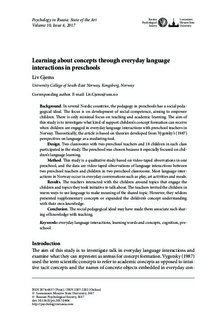Learning about concepts through everyday language interactions in preschools
Journal article, Peer reviewed
Published version

View/
Date
2017Metadata
Show full item recordCollections
- Institutt for pedagogikk [285]
- Publikasjoner fra CRIStin [3623]
Original version
Psychology in Russia: State of the Art. 2017, 10 (4), 33-44. 10.11621/pir.2017.0404Abstract
Background. In several Nordic countries, the pedagogy in preschools has a social pedagogical ideal. The focus is on development of social competence, aiming to empower children. There is only minimal focus on teaching and academic learning. The aim of this study is to investigate what kind of support children’s concept formation can receive when children are engaged in everyday language interactions with preschool teachers in Norway. Theoretically, the article is based on theories developed from Vygotsky’s (1987) perspectives on language as a mediating tool. Design. Two classrooms with two preschool teachers and 18 children in each class participated in the study. The preschool was chosen because it especially focused on children’s language learning. Method. This study is a qualitative study based on video-taped observations in one preschool, and the data are video-taped observations of language interactions between two preschool teachers and children in two preschool classrooms. Most language interactions in Norway occur in everyday conversations such as play, art activities and meals. Results. The teachers interacted with the children around topics that engage the children and topics they took initiative to talk about. The teachers invited the children in warm ways to use language to make meaning of the shared topic. However, they seldom presented supplementary concepts or expanded the children’s concept understanding with their own knowledge. Conclusion. The social pedagogical ideal may have made them associate such sharing of knowledge with teaching.
